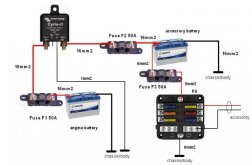Jack Mmkay
New Member
- Joined
- Feb 22, 2021
- Messages
- 17
HI! I wanted to share an idea with y'all electrical masterminds.
I want to keep my electrical system as low cost and little component and simple as possible : All I want is to charge my laptop, phone and maybe power bank.
Could I theoretically simply have one huge 200 AH AGM battery that I use both to start the car and charge my appliances safely and without damaging any components?
Reason is I don't wanna spend 200€on a dc dc battery charger and another 200+ on a secondary battery and 100+ on fuses, cables and relays I don't have experience with electricity so certainly I'd fck something up.
Thoughts ? Ah and I know this is a solar forum but I wanna keep as low profile / stealth as possible with my wan so solar would be a nope for now ( short roof = visible panels )
Is there a reason I couldn't use a big agm battery as starter battery in my 1998 2.4D VW T4?
Thanks again !
I want to keep my electrical system as low cost and little component and simple as possible : All I want is to charge my laptop, phone and maybe power bank.
Could I theoretically simply have one huge 200 AH AGM battery that I use both to start the car and charge my appliances safely and without damaging any components?
Reason is I don't wanna spend 200€on a dc dc battery charger and another 200+ on a secondary battery and 100+ on fuses, cables and relays I don't have experience with electricity so certainly I'd fck something up.
Thoughts ? Ah and I know this is a solar forum but I wanna keep as low profile / stealth as possible with my wan so solar would be a nope for now ( short roof = visible panels )
Is there a reason I couldn't use a big agm battery as starter battery in my 1998 2.4D VW T4?
Thanks again !



